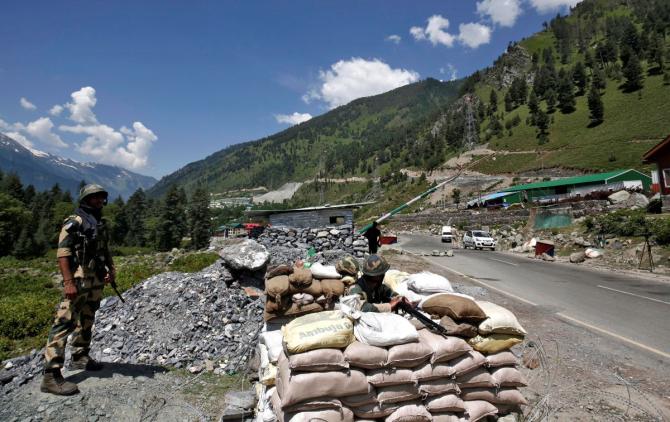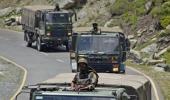India's top military and strategic brass on Tuesday reviewed the overall situation in eastern Ladakh amid indications that the latest round of talks between senior military commanders of Indian and Chinese armies on the next phase of disengagement of troops may not have produced encouraging results, people familiar with the developments said.

They said India will maintain a high-level of alertness in all the sensitive areas along the Line of Actual Control (LAC), and that the Army has started preparations to maintain its current strength of troops and heavy weaponry in eastern Ladakh during the winter months.
With China showing reluctance to disengage its troops from areas like Pangong Tso and Depsang, Defence Minister Rajnath Singh, External Affairs Minister S Jaishankar, National Security Advisor Ajit Doval and Army Chief General M M Naravane reviewed various aspects of the three month-old border standoff.
A number of other officials were part of the meeting of the China Study Group which also includes Foreign Secretary Harsh Vardhan Shringla and Defence Secretary Ajay Kumar.
It is learnt that Gen Naravane apprised the meeting about deployment of troops and necessary arrangements that will be required for stationing the soldiers in the high-altitude region during the harsh winter months when the temperature goes down below minus 20 degree celsius.
"There is no question of lowering our guard at all," a person aware of the deliberations at the meeting said without elaborating.
At the fifth round of military talks on Sunday, the Indian army categorically conveyed to China's PLA that it will not compromise on India's territorial integrity, and that the disengagement of troops from Pangong Tso and a few other friction points in eastern Ladakh should be completed at the earliest.
The Indian delegation also very clearly and firmly communicated to the Chinese side that restoration of status quo ante in all areas of eastern Ladakh was key for overall ties between the two countries, and that Beijing must ensure complete disengagement of its troops from the remaining friction points, sources said.
They said there was no option for the Chinese military but to disengage from the friction points as demanded by India.
"We are ready for a long haul," said an official on the condition of anonymity.
There have been indications that the negotiations may not have produced very encouraging results, and that both sides will hold more talks to resolve the border row, they said.
Chinese Foreign Ministry Spokesman Wang Wenbin, meanwhile, said the two sides should always place the boundary issue in an 'appropriate position' in bilateral relations, and avoid differences escalating into disputes.
Wang made this remark at a media briefing in Beijing when asked to comment on Minister Jaishankar's comments in a recent interview to a leading English daily in India that the state of the India-China border and the future of the ties between the two countries cannot be separated. The question was posed by a representative of the Chinese official media.
The Chinese army has pulled back from Galwan Valley and certain other areas but the withdrawal of troops has not moved forward from the Finger Four and Eight in Pangong Tso as demanded by India.
The mountain spurs in the area are referred to as Fingers. China also has not completed withdrawal of troops from Gogra areas.
The focus of the Sunday talks was on finalising the modalities for further de-escalation, and disengagement of troops from various friction points, sources said.
The Indian delegation was led by Lt Gen Harinder Singh, the commander of the Leh-based 14 Corps, while the Chinese side was headed by Major General Liu Lin, commander of the South Xinjiang military region.
The previous round of Corps Commander-level talks had taken place on July 14 and it lasted for nearly 15 hours.
The Sunday military talks on the Chinese side of the LAC took place 10 days after both sides held another round of diplomatic talks on the border standoff.
The formal process of disengagement of troops began on July 6, a day after a nearly two-hour telephonic conversation between National Security Advisor Ajit Doval and Chinese Foreign Minister Wang Yi on ways to bring down tension in the area.
The first round of the Lt General talks was held on June 6 during which both sides finalised an agreement to disengage gradually from all the standoff points beginning with Galwan Valley.
However, the situation deteriorated following the Galwan Valley clashes on June 15 in which 20 Indian Army personnel were killed as the two sides significantly bolstered their deployments in most areas along the LAC.
The Chinese side also suffered casualties in the June 15 clashes but it is yet to give out the details. According to an American intelligence report, the number of casualties on the Chinese side was 35.
The second round of talks took place on June 22.
In the third round of military talks on June 30, both sides agreed on an 'expeditious, phased and step wise' de-escalation as a 'priority' to end the standoff.
Following the Galwan Valley incident, the government has given the armed forces 'full freedom' to give a 'befitting' response to any Chinese misadventure along the LAC.
The Army has sent thousands of additional troops to forward locations along the border following the violent clashes.
The IAF has also moved air defence systems as well as a sizable number of its frontline combat jets and attack helicopters to several key air bases.










